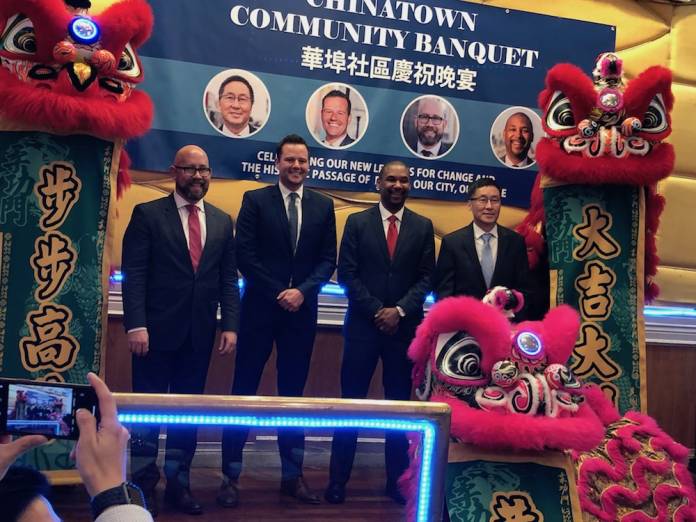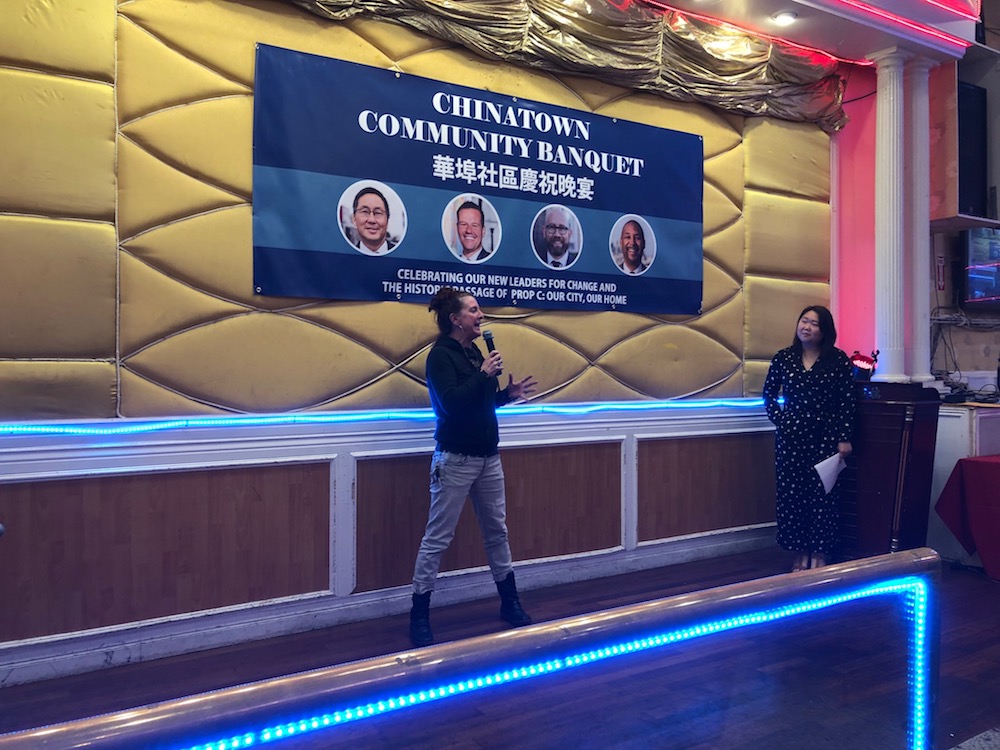
It was a time to celebrate in San Francisco tonight. Progressive groups in Chinatown held a banquet for the new supervisors, who ran on a platform of change that included support for Prop. C, which raised taxes on the biggest corporations in town.
The Community Tenants Association, the Chinese Progressive Association, and the Rose Pak Democratic Club were feting the new supes.
But before any of the politicians spoke, Jennifer Freidenbach, the director of the Coalition on Homelessness, was called to the stage.

Prop. C, she said, was “decades in the making.” The time to move was 2018, she said, when the city “was wildly affluent and destitution and poverty were widespread.”
The concept of Prop. C was clear from the start: The city, the voters, needed to take money from the wealthiest and spend it on the neediest.
Shaw-San Liu, director of the Chinese Progressive Association, echoed those thoughts. The community is fighting, she said, “to take power away from the corporate elites and give it back to the rest of us.”
Those were profound and critical statements for the future of San Francisco, and as the supes prepare to vote for a new president, I hope they keep them in mind. Progressive change doesn’t start with compromise – it starts with a battle to take wealth and power away from those who have it.

Equity, as Harvard professor Susan Fainstein argues, is by definition redistributive. It’s not enough to talk about working together to make the city better: There are people who have too much, and they won’t give it up easily, and the progressive agenda is, by definition, about a battle. Creating new jobs and wealth opportunities will never be enough; part of the struggle is and must be taking wealth from those who have too much and sharing it with those who have too little.
Thanks, Shaw-San, for making the point so clear: Progressive politics is about taking power away from the corporate elites and give it back to the rest of us.
We celebrated the victory of four new supes. Now we have to remind them that, while compromise and working together is part of politics, it has to start with a goal – and that goal is equity.
So I got home and read Gavin Newsom’s inaugural speech and all the laudatory press he got for saying that the state needs better funding for education and health care for all. Those are fine goals – and if his record as mayor of San Francisco is any indication, he will talk about them a lot, and act a lot less.
Most of his speech was about how California is united – and on a lot of issues, like immigration and fighting Trump, we are. But on fundamental issues of equity, we are not united – there is a huge divide between the very rich and the people who want a more fair and just economy.
Newsom:
We face a gulf between the rich and everyone else – and it’s not just inequality of wealth, it’s inequality of opportunity.
Actually, it is inequality of wealth. That’s what creates inequality of opportunity.
His address was defined by what the New York Times once called the “Davos Problem.” The elites of the world go to Davos, Switzerland to talk about global economic issues – but never, in any of the talks, is there any consideration that any of the rich and powerful people in that room might have to give up anything they have to make the rest of the world better off.
You can’t fix massive economic inequality by saying that a rising tide will lift all boats. You can’t say we are all going to come together and sing songs and hold hands and our heroic spirt and cooperation will solve all of our problems.
When Alexandria Ocasio-Cortez said that the marginal tax rate on the wealthy in the US should be 70 percent, most of the pundits said she was crazy. Actually, as Nobel-prize-winning economist Paul Krugmann points out, she’s right:
The controversy of the moment involves AOC’s advocacy of a tax rate of 70-80 percent on very high incomes, which is obviously crazy, right? I mean, who thinks that makes sense? Only ignorant people like … um, Peter Diamond, Nobel laureate in economics and arguably the world’s leading expert on public finance. (Although Republicans blocked him from an appointment to the Federal Reserve Board with claims that he was unqualified. Really.) And it’s a policy nobody has ever implemented, aside from … the United States, for 35 years after World War II — including the most successful period of economic growth in our history. …
What this implies for economic policy is that we shouldn’t care what a policy does to the incomes of the very rich. A policy that makes the rich a bit poorer will affect only a handful of people, and will barely affect their life satisfaction, since they will still be able to buy whatever they want.
There are going to be winners and losers in California and San Francisco, and if the very wealthy don’t have to lose power and wealth, the rest of us won’t win. That’s what Newsom never got, and still doesn’t get. And it’s what I hope the new supervisors will understand when it comes time to find new leadership and set policy.


